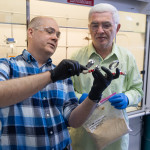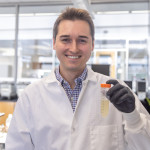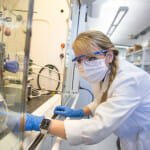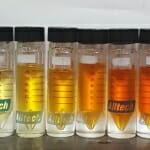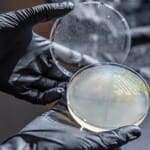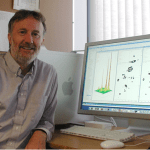Tag Great Lakes Bioenergy Research Center
UW–Madison biochemist wins prestigious forestry prize for discoveries that support sustainable energy and product innovations
UW–Madison biochemistry professor John Ralph has been awarded the forestry industry's top prize, alongside collaborator Wout Boerjan, a professor at Ghent University in Belgium, for their groundbreaking research on the molecular structure of lignin, one of the main components of plant cell walls. Read More
UW–Madison researchers develop better way to make painkiller from trees
The process is primarily water based, relies on green solvents, and is continuous rather than a batch reaction, which makes it ideal for industrial applications. Read More
Multitasking microbes: UW–Madison scientists engineer bacteria to make two valuable products from plant fiber
UW researchers have engineered bacteria that can produce two chemical products at the same time from underutilized plant fiber. The discovery could help make biofuels more sustainable and commercially viable. Read More
DOE renews funding for Great Lakes Bioenergy Research Center; UW–Madison hub to receive $27.5 million for 2023
The extension will allow GLBRC scientists to continue foundational research to enable the breakthroughs needed for the cost-effective conversion of non-food plants into low-carbon replacements for jet fuel, diesel and other fossil fuels. Read More
At bioenergy crossroads, should corn ethanol be left in the rearview mirror?
New research shows that the carbon emissions from using land to grow corn can negate or even reverse any climate advantages of corn ethanol relative to gasoline. Read More
Donohue to lead Wisconsin Energy Institute
Tim Donohue, a professor of bacteriology, has led the institute as interim director since 2017. WEI provides leadership in energy and clean technology research, scholarship, education and outreach. Read More
Great Lakes research to fuel emerging bioeconomy
GLBRC is laying the groundwork for economically viable and environmentally sustainable biorefineries that use dedicated bioenergy crops grown on land unsuitable for food production — work that could serve as a cornerstone for an emerging bioeconomy. Read More
Bioenergy research discovery paves way to production of new hydrocarbon
A team of researchers have described a pathway for furan fatty acid production in bacteria and other cells. This long chain fatty acid could substitute for petroleum-based products including fuel, engine lubricant, medicines and food additives. Read More
Grassland conservation crucial to success of bioenergy
Protecting these natural lands right here in the U.S. offers an opportunity to make meaningful strides toward climate change mitigation while also improving wildlife habitat, water quality, and the delivery of many other ecosystem services. Read More
Researchers find value in unusual type of plant material
UW-Madison scientists have shown that a recently-discovered variety of lignin, catechyl lignin (C-lignin), has attributes that could make it well-suited as the starting point for a range of bioproducts. Read More
Better solvents = better biomass conversion for biofuels and bioproducts
UW-Madison researchers are pushing for a broader understanding of solvents used to convert non-food biomass to biofuels and bioproducts, which would help them to optimize biomass conversion reactions. Read More


